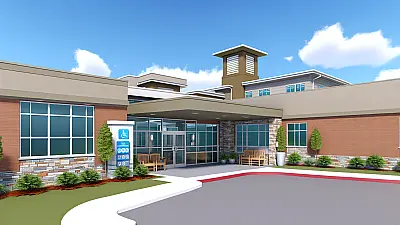NEW IBERIA, LA - A Louisiana nursing facility failed to properly follow federal screening requirements for a resident with mental health conditions, according to a recent state inspection that found violations of preadmission screening protocols.

Mental Health Screening Violation Discovered
Belle Teche Nursing & Rehabilitation Center in New Iberia was cited for failing to refer a resident with diagnosed mental disorders to the appropriate state authority for required Level II PASARR (Preadmission Screening and Resident Review) evaluation. The violation involved a resident who had been diagnosed with both bipolar disorder and major depressive disorder.
The inspection found that while the resident was admitted to the facility with these mental health diagnoses, the facility's initial Level I PASARR screening form dated October 7, 2022, did not properly identify the bipolar disorder diagnosis. Specifically, when asked whether the resident had been diagnosed with mental illness, including conditions like bipolar disorder and major depressive disorder, the bipolar disorder box was not checked on the screening form.
Understanding PASARR Requirements
PASARR screening is a federal requirement designed to ensure that nursing home residents with mental illness or intellectual disabilities receive appropriate care and services. The two-level screening process helps determine whether nursing home placement is appropriate and what specialized services may be needed.
Level I screening is conducted by the nursing facility and identifies potential mental health or developmental disabilities. When mental illness is identified, facilities must request a Level II evaluation from the state's designated mental health authority. This more comprehensive assessment determines whether the individual needs specialized mental health services and whether nursing home placement is the most appropriate setting.
The screening process serves as a critical safeguard to prevent inappropriate institutionalization and ensure residents receive proper mental health treatment. When facilities fail to complete required screenings, residents may not receive necessary psychiatric services or may be placed in settings that cannot adequately address their needs.
Timeline of the Violation
Records show that the resident was admitted to Belle Teche with documented diagnoses including bipolar disorder and major depressive disorder. However, the facility's Level I PASARR form failed to properly identify the bipolar disorder diagnosis despite this being a qualifying condition that should have triggered a Level II screening request.
The violation became more significant when, on October 10, 2022, the resident received a new diagnosis of bipolar psychosis. At this point, facility staff should have recognized the need for a Level II PASARR evaluation and submitted the required request to state authorities.
During the inspection interview on May 20, 2025, a facility social services designee confirmed that after reviewing psychiatric progress notes from October 9, 2022, the resident did indeed have a qualifying Level II diagnosis of bipolar psychosis. The staff member acknowledged that a request for Level II screening was not submitted and stated that "the request for a Level II screening should have been submitted."
Medical Significance of Proper Mental Health Assessment
Bipolar disorder and major depressive disorder are serious mental health conditions that require specialized treatment approaches. Bipolar disorder involves episodes of mania and depression that can significantly impact a person's ability to function and make decisions about their care. Major depressive disorder can affect appetite, sleep, energy levels, and overall quality of life.
When nursing facilities fail to properly identify and refer residents with these conditions for comprehensive mental health evaluation, several risks emerge. Residents may not receive appropriate psychiatric medications, therapy services, or behavioral interventions. Without proper assessment, care plans may not address the specific needs associated with mental health conditions, potentially leading to increased agitation, depression, or other psychiatric symptoms.
The PASARR process also helps determine whether a nursing facility can adequately serve a resident's mental health needs or whether alternative community-based services would be more appropriate. Bypassing this evaluation process prevents residents and their families from accessing potentially better-suited care options.
Regulatory Standards and Best Practices
Federal regulations require nursing facilities to coordinate with PASARR screening programs to ensure appropriate placement and services for residents with mental health conditions. Facilities must complete accurate Level I screenings and submit Level II referrals when qualifying mental health diagnoses are present.
Best practices include training admission staff to recognize mental health diagnoses that trigger PASARR requirements, establishing clear procedures for submitting Level II requests, and implementing quality assurance measures to verify screening compliance. Facilities should also maintain documentation showing that required screenings were completed and that any necessary referrals were submitted to state authorities.
Additional Issues Identified
The inspection focused specifically on PASARR compliance and identified this single violation affecting one resident out of three investigated cases. The facility demonstrated proper screening procedures for the other two residents examined during the survey.
The violation was classified as causing minimal harm or potential for actual harm, affecting few residents. However, the failure to follow federal screening requirements represents a significant procedural oversight that could impact resident care and access to appropriate mental health services.
State inspectors noted that the facility's social services staff acknowledged the error and confirmed that the Level II screening request should have been submitted when the resident's bipolar disorder diagnosis was identified. This recognition suggests awareness of the proper procedures, though implementation failed in this specific case.
Full Inspection Report
The details above represent a summary of key findings. View the complete inspection report for Belle Teche Nursing & Rehabilitation Center from 2025-05-21 including all violations, facility responses, and corrective action plans.
💬 Join the Discussion
Comments are moderated. Please keep discussions respectful and relevant to nursing home care quality.